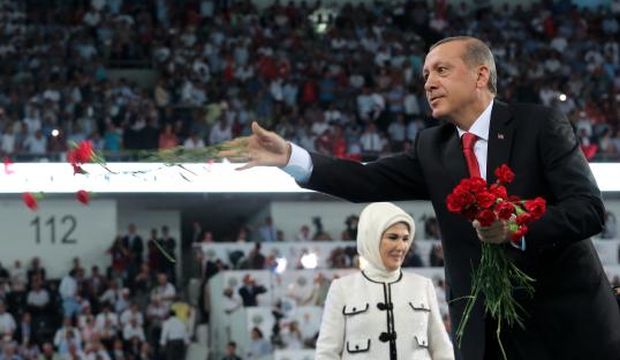
Turkish President-elect Recep Tayyip Erdoğan (R) throws flowers to his supporters during a congress of Turkey’s ruling Justice and Development Party (AKP) for the election of a new prime minister in Ankara, Turkey, August 27, 2014. (EPA/Stringer)
Ankara, Reuters—In a farewell speech to supporters of his Justice and Development Party (AKP), Turkish President-elect Recep Tayyip Erdoğan said the AKP’s mission to reshape the nation would go on after he left party politics and took office as head of state.
Erdoğan, who is due to be inaugurated as president on Thursday, said today was the birth of a new Turkey.
He dismissed suggestions that a new cabinet led by incoming prime minister Ahmet Davutoğlu would be a “caretaker” government and he made clear its priorities would not deviate from the path he had set as premier.
“What is changing today is the form, not the essence. The mission which our party has assumed, the spirit of its cause, its goals and ideals are not changing,” Erdoğan said in his last speech as leader of the movement he co-founded 13 years ago.
Erdoğan forged the AKP as a coalition of conservative religious Muslims, nationalists and reforming center-right elements in 2001 in what was later heralded as a potential model for political Islam.
Under the constitution, Erdoğan must cut his ties to the party as president and skeptics question how tightly it can hold together without his imperious leadership.
His supporters see him as a hero for restoring religious values to public life in a political landscape that had been dominated by the secular ideals of Mustafa Kamal Atatürk since he founded the modern republic in 1923.
His critics, including Western-facing, secular Turks, fear an increasingly authoritarian state.
Thousands of AKP faithful attended the party congress in Ankara and thousands more watched on large screens under blazing sunshine outside.
The heavily choreographed event, at which Foreign Minister Davutoğlu will formally be voted in as party leader and de facto prime minister later on Wednesday, opened with a film charting Erdoğan’s political career.
Davutoğlu took the podium to say Turkey needed a new constitution with a liberal character to replace a text born of a 1980 coup. This would introduce the executive presidency Erdoğan openly covets.
“Erdoğan’s legacy is our honor and will be defended to the end,” Davutoğlu said in his speech.
He promised to keep the party united, press ahead with a Kurdish peace process, and maintain Turkey’s efforts towards European Union membership.
Erdoğan has made clear he intends to stay politically active and wield greater power than predecessors whose role was largely ceremonial.
“A president’s duty is not to obstruct the government but to open the way for it,” he said, in an apparent bid to reassure his critics.
Erdoğan said earlier he would ask Davutoğlu to form a new government on Thursday and the new cabinet would be announced on Friday.
The current economic team, including Deputy Prime Minister Ali Babacan and Finance Minister Mehmet Şimşek, is expected to remain largely intact, while intelligence chief Hakan Fidan, a close Erdoğan confidante, and EU Minister Mevlüt Çavuşoğlu are leading contenders for foreign minister.
Erdoğan aide Yalçın Akdoğan was also expected to take up a position in cabinet, possibly as a deputy prime minister, while AK deputy chairman Mustafa Sentop is seen as a candidate for justice minister, senior officials have said.
Davutoğlu’s role, besides continuing many of Erdoğan’s core policies, will also be to deliver success in a parliamentary election next June, according to Hatem Ete, director of the Ankara-based think-tank SETA.
A stronger majority would boost the party’s chances of changing the constitution and establishing the presidential system Erdoğan desires.
“The most important item on his agenda will be to ensure that the AKP does not lose votes in this time, or better yet, increases its votes,” Ete said.
Davutoğlu also repeated that fighting the “parallel state,” a term senior officials use to describe supporters of US-based Muslim cleric, Fethullah Gülen, would remain a priority.
Erdoğan’s government accuses Gülen’s network of followers, who wield influence in the police and judiciary, of infiltrating state institutions and trying to unseat the government with street protests last summer and a corruption scandal which erupted in December.
